UK Covid inquiry, Sophie Kinsella, Rower Imogen Grant
Woman's Hour
BBC
4.2 • 2.9K Ratings
🗓️ 8 October 2024
⏱️ 58 minutes
🧾️ Download transcript
Summary
If you remember the #butnotmaternity campaign during the Covid-19 pandemic you’ll recall that women were sometimes left to give birth without their partners. Those restrictions for maternity care were left in place far too long affecting the mental health of mothers and staff. That's according to evidence given to the Covid-19 inquiry which this week is looking at the subject in detail. The inquiry has been listening to the impact on women from 13 pregnancy, baby and parent organisations. We hear from our correspondent who has been following it, Jim Reid, and from Jenny Ward, the CEO of the Lullaby Trust, who gave evidence on behalf of all the organisations. And we talk to Daisie Lane who tells us of her own experience and her book chronicling 150 other women's experiences.
Bestselling author Sophie Kinsella, known for the hugely popular Shopaholic series and many other bestsellers, has sold over 45 million books which have been translated into more than 40 languages. Her latest novel, What Does It Feel Like?, is her most autobiographical yet. It tells the story of a novelist who wakes up in a hospital bed with no memory of how she got there and learns she’s had surgery to remove a large tumour growing in her brain. She must re-learn how to walk, talk, and write again. Six months ago, Sophie shared with her readers on social media that in 2022, she had been diagnosed with glioblastoma, a type of aggressive brain cancer. It’s known for its poor prognosis with only 25% of people surviving more than one year, and only 5% survive more than five years.
A murder investigation has been launched after the body of a 22-year-old woman was found in south Belfast. Mary Ward is the fourth woman to be murdered in the space of six weeks in Northern Ireland. The Police Service of Northern Ireland - or PSNI - have referred the case to the office of the Police Ombudsman. Earlier this year, the PSNI released figures showing that in the five years between 2019 and 2024, 30 women and girls across Northern Ireland were killed by men. To put that into context, the population of Northern Ireland is around 1.9 million. We hear from Alison Morris - the Crime Reporter for the Belfast Telegraph.
Woman's Hour is joined by the winner of the BBC Green Sport Award, the rower Imogen Grant. Campaigning for cleaner rivers, being vegan and buying fewer clothes are all things Imogen does to protect the environment. She also talks about winning gold at Paris 2024.
Presenter: Nuala McGovern Producer: Kirsty Starkey
Transcript
Click on a timestamp to play from that location
| 0:00.0 | Before you listen to this BBC podcast I'd like to tell you why I love |
| 0:03.7 | podcasting. I'm Natasha Aronson I'm an assistant commissioner for the BBC and I work on |
| 0:09.4 | making podcasts my real passion is discovering unbelievable unheard stories and working with the biggest |
| 0:16.9 | stars who can really bring those stories to life. |
| 0:20.1 | I love the whole process of making podcasts from the spark of an idea to hearing the final edit. |
| 0:26.4 | There's nothing like it. What makes BBC Podcast special is that we're working for you. |
| 0:31.0 | So whatever we commission has to reflect the things that you care about and love wherever you are in the |
| 0:36.0 | UK. So if you like this BBC podcast, there's so much more to discover. Have a listen on BBC Sounds. |
| 0:47.0 | BBC Sounds. BBC Sounds, music radio podcasts. Hello, this is Nula McGovran and you're listening to the Woman's Hour podcast. |
| 0:52.0 | Hello, you're very welcome the Woman's Hour podcast. |
| 0:52.6 | Hello, you're very welcome to the program. |
| 0:54.6 | Well, Sophie Kinsella will be with us in the Woman's Hour studio soon. |
| 0:58.2 | The hugely successful author has written the most beautiful book following her diagnosis of a form of |
| 1:04.7 | aggressive brain cancer. The book is unputdownable. We're going to speak to |
| 1:09.3 | Sophie. Also the COVID-19 inquiry continues. Evidence on maternity services during the pandemic was given yesterday. |
| 1:15.9 | Some aspects of the restrictions that were introduced at the time |
| 1:19.6 | were heavily criticized. |
| 1:21.2 | We'll hear why, and also from a mother who says she labored alone |
| 1:24.3 | and now has PTSD from that experience. Some women who were pregnant maybe |
| 1:29.4 | welcome to the safety measures that were put in place at that time but wherever you stand if you |
| 1:34.6 | were pregnant during the years of COVID-19 I'd like to hear your story today about the |
| 1:39.9 | birth or the aftermath effect of having a baby in that very particular time. |
... |
Please login to see the full transcript.
Disclaimer: The podcast and artwork embedded on this page are from BBC, and are the property of its owner and not affiliated with or endorsed by Tapesearch.
Generated transcripts are the property of BBC and are distributed freely under the Fair Use doctrine. Transcripts generated by Tapesearch are not guaranteed to be accurate.
Copyright © Tapesearch 2025.

